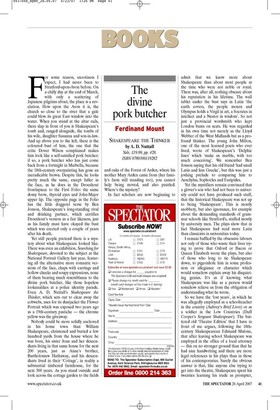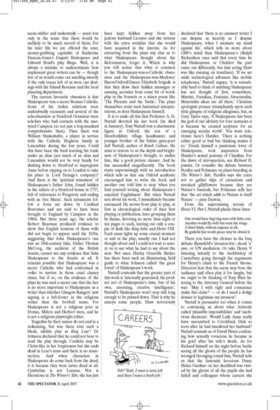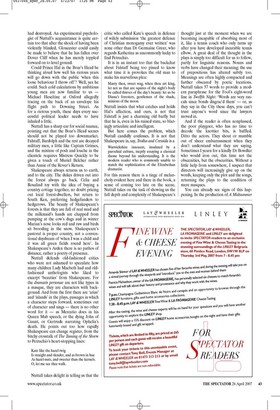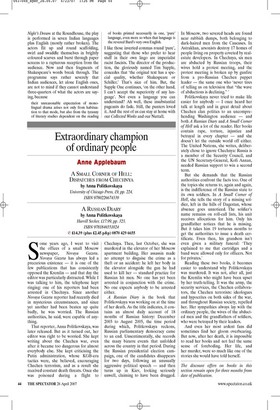The divine pork butcher
Ferdinand Mount
SHAKESPEARE THE THINKER by A. D. Nuttall Yale, £19.99, pp. 428, ISBN 9780300119282 For some reason, snootiness I expect, I had never been to Stratford-upon-Avon before. On a chilly day at the end of March, with only a scattering of Japanese pilgrims about, the place is a revelation. How upon the Avon it is, the church so close to the river that a gale could blow its great East window into the water. When you stand at the altar rails, there slap in front of you is Shakespeare’s tomb and, ranged alongside, the tombs of his wife, daughter Susanna and son-in-law. And up above you to the left, there is the coloured bust of him, the one that the critic Dover Wilson complained makes him look like a self-satisfied pork butcher; if so, a pork butcher who has just come back from a fortnight in Marbella, because the 18th-century overpainting has gone an ineradicable brown. Despite this, he looks pretty much the same, except fuller in the face, as he does in the Droeshout frontispiece to the First Folio: the same domy brow, thyroid eyes and John-Major upper lip. The opposite page in the Folio has the little doggerel verse by Ben Jonson, Shakespeare’s long-standing rival and drinking partner, which certifies Droeshout’s version as a fair likeness, just as his family must have okayed the bust which was erected only a couple of years after his death.
Yet still people pretend there is a mystery about what Shakespeare looked like. There was even an exhibition, Searching for Shakespeare, devoted to the subject at the National Portrait Gallery last year, featuring all the alternative more romantic versions of the face, chaps with earrings and hollow cheeks and soupy expressions, none of them bearing much resemblance to the divine pork butcher, like those hopeless lookunalikes at a police identity parade. Even A. D. Nuttall’s Shakespeare the Thinker, which sets out to clear away the cobwebs, uses for its dustjacket the Flower Portrait which was exposed two years ago as a 19th-century pastiche — the chrome yellow was the giveaway.
Nobody could be more solidly anchored in his home town than William Shakespeare, christened and buried a few hundred yards from the house where he was born, his sister Joan and her descendants living in that same house for the next 200 years, just as Anne’s brother, Bartholomew Hathaway, and his descendants lived in their ‘Cottage’, in reality a substantial timbered farmhouse, for the next 300 years. As you stand outside and look across the cottage garden to the fields and oaks of the Forest of Arden, where his mother Mary Arden came from (her family’s farm still standing too), you cannot help being moved, and also puzzled. Where’s the mystery?
In fact scholars are now beginning to admit that we know more about Shakespeare than about most people at the time who were not noble or royal. There was, after all, nothing obscure about his reputation in his lifetime. The wall tablet under the bust says in Latin ‘the earth covers, the people mourn and Olympus holds a Virgil in art, a Socrates in intellect and a Nestor in wisdom’. So not just a provincial wordsmith who kept London bums on seats. He was regarded in his own time not merely as the Lloyd Webber of the West Midlands but as a profound thinker. The young John Milton, one of the most learned poets who ever lived, wrote of Shakespeare’s ‘Delphic lines’ which ‘make us marble, with too much conceiving’. We remember Ben Jonson saying that his old friend ‘had small Latin and less Greeke’, but this was just a joshing prelude to comparing him to Aeschylus, Sophocles and Euripides.
Yet the mystifiers remain convinced that a glover’s son who had not been to university could not have produced such stuff, that the historical Shakespeare was not up to being ‘Shakespeare’. This is mostly snobbery, but also ignorance, for example about the demanding standards of grammar schools like Stratford’s, staffed mostly by university men. The plays show that in fact Shakespeare had read more Latin than classicists in universities today.
I remain baffled by the obsessive labours not only of those who waste their lives trying to prove that Oxford or Bacon or Queen Elizabeth wrote the plays, but also of those who long to tie Shakespeare down, to pigeonhole him in some profession or allegiance or character which would somehow explain away his disquieting genius. It’s as if knowing what Shakespeare was like as a person would somehow relieve us from the obligation of understanding what he wrote.
So we have the ‘lost years’, in which he was allegedly employed as a schoolteacher in the country (Aubrey’s Brief Lives) or as a soldier in the Low Countries (Duff Cooper’s Sergeant Shakespeare). The battered old ‘Theatre Edition’ that I have in front of me argues, following the 18thcentury Shakespearean Edmund Malone, that after leaving school Shakespeare was employed in the office of a local attorney — this on no stronger ground than that he had nice handwriting and there are more legal references in his plays than in those of his contemporaries. Surely the obvious answer is that, like anyone else trying to get into the theatre, Shakespeare spent his twenties learning his trade as prompter, scene-shifter and understudy — years lost only in the sense that there would be unlikely to be much record of them. For his later life we are offered the sour, money-grubbing capitalist of Katherine Duncan-Jones’s Unquiet Shakespeare and Edward Bond’s play Bingo. Well, it is always a mistake to underestimate how unpleasant great writers can be — though few of us would come out smelling sweetly if the only traces left of us were our dealings with the Inland Revenue and the local planning department.
The current favourite obsession is that Shakespeare was a secret Roman Catholic. Some of his Arden relations were undoubtedly recusants and several of the schoolmasters at Stratford Grammar were scholars who had contacts with the martyred Campion (so not just a bog-standard comprehensive then). Then there was William Shakeshafte, a player in service with the Catholic Hoghton family in Lancashire during the lost years. Could this have been the bard learning his trade under an alias (not much of an alias and Lancashire would not be very handy for dashing down to Stratford to impregnate Anne before zipping on to London to take his place in Lord Strange’s company)? And there is the ‘spiritual testament’ of Shakespeare’s father John, found hidden in the rafters of a Stratford house in 1737, full of references to Purgatory and ending with an ‘Ave Maria’. Such testaments follow a form set down by Cardinal Borromeo and are said to have been brought to England by Campion in the 1580s. But three years ago, the scholar Robert Bearman produced evidence to show that English versions of these wills did not begin to appear until the 1630s, suggesting that John Shakespeare’s one was an 18th-century fake. Father Thomas McCoog, the archivist of the British Jesuits, cannot see any evidence that links Shakespeare to the Jesuits at all. It remains possible that Shakespeare was a secret Catholic who had conformed in order to survive in those cruel chancy times, but if so, on the evidence of the plays he was such a secret one that the fact is no more important to Shakespeare as a writer than whether Glasgow Rangers’ new signing is a left-footer in the religious rather than the football sense. For Shakespeare is not a religious poet as Donne, Milton and Herbert were, and he is not a religious playwright either.
Tragedies by their nature do not end in a redeeming, but was there ever such a bleak, nihilist play as King Lear? Dr Johnson declared that he could not bear to read the play through. Cordelia may be Christ-like in her forgiveness but she ends dead in Lear’s arms and there is no resurrection. And when characters in Shakespeare do come back from the dead, it is because they were never dead at all. Cymbeline is not Lazarus. Nor is Hermione in The Winter’s Tale; she has just been kept hidden away from her jealous husband Leontes and she returns with the extra wrinkles that she would have acquired in the interim. As for extracting from the plays any clue as to what Shakespeare thought about the Reformation, forget it. Which is why you will notice that what is common to the Shakespeare-was-a-Catholic obsessives and the Shakespeare-was-Marlowe/ Bacon/Oxford/Queen Elizabeth brigade is that they draw their hidden messages or cunning acrostics from some bit of wordplay in the Sonnets or a minor poem like ‘The Phoenix and the Turtle’. The plays themselves resist such fantastical interpretations, as does Shakespeare himself.
It is to undo all this that Professor A. D. Nuttall devoted his last book (he died in January). Tony Nuttall was a charismatic figure at Oxford, the son of a Herefordshire village headmaster and younger brother of the Sixties guru-poet Jeff Nuttall, author of Bomb Culture. He aims to restore to us the depth and brightness of Shakespeare’s thought, to undim him, like a good picture cleaner. And he has succeeded magnificently. The book starts unpromisingly with an introduction which tells us that one Oxford academic encouraged him to write the book and another one told him to stop ‘when you find yourself writing about Shakespeare’s essential Englishness’. But when Nuttall sets about his work, I immediately became entranced. He moves from play to play, at first in chronological order of their first playing or publication, later grouping them by theme, devoting no more than eight or ten pages to each, leaving out only a couple of duds like King John and Henry VIII. Each essay lights up some crucial moment or nub in the play, usually one I had not thought about and I could not wait to scurry on to see what he had to say about the next. Not since Harley Granville Barker has there been such an illuminating field guide to what Johnson called ‘the great forest’ of Shakespeare’s work.
Nuttall contends that the greater part of this work is ‘internally generated, the product not of Shakespeare’s time, but of his own, unresting, creative intelligence’. Nuttall’s Shakespeare won’t stop still long enough to be pinned down. That is why he annoys some people. Shaw notoriously declared that ‘there is no eminent writer I can despise as heartily as I despise Shakespeare, when I measure my mind against his’, which tells us more about GBS’s mind than Shakespeare’s (Ralph Richardson once said that every time he did Shakespeare or Chekhov the part came out differently, but that acting Shaw was like running on tramlines). ‘If we set aside technological advances like mobile telephones,’ Nuttall argues, ‘it is remarkably hard to think of anything Shakespeare has not thought of first, somewhere. Marxist, Freudian, Feminist, Structuralist, Materialist ideas are all there.’ Christian apologists pounce triumphantly upon each little glimpse of religious allegiance, but, as Gary Taylor says, ‘if Shakespeare has been the god of our idolatry for four centuries it is because he created scripture for an emerging secular world’. You want relativism: here’s Hamlet. ‘There is nothing either good or bad but thinking makes it so.’ Freud, himself a passionate lover of Shakespeare, took inspiration from Hamlet’s sexual jealousy of Claudius. For the dawn of introspection, see Richard II, passim. Or consider the debate between Perdita and Polixenes on plant-breeding in The Winter’s Tale. Perdita says she cares not to gather slips of carnations and streaked gillyflowers because they are Nature’s bastards, but Polixenes tells her that ‘the art which adds to Nature is itself Nature’ — pure Darwin.
From the unpromising terrain of Henry VI, Part I, Nuttall plucks these lines:
One would have ling’ring wars with little cost; Another would fly swift but want the wings. A third think, without expense at all, By guileful fair words peace may be obtain’d.
There you have the choices in the Iraq debate: Rumsfeld’s ‘invasion-lite’, shock ’n’ awe, or UN mediation. Or take Henry V listening intently to the Archbishop of Canterbury going through the arguments for Henry’s claim to the French throne. Directors fear that the scene may bore the audience and often play it for laughs, but we ought to be thinking of Tony Blair listening to the Attorney General before the war: ‘May I with right and conscience make this claim?’ — or do I need a dodgy dossier to legitimise my invasion?
Nuttall is persuasive too when it comes to convincing us about what Aristotle called ‘plausible impossibilities’ and ‘unobvious decisions’. Would Lady Anne really have succumbed to Crookback Dick so soon after he had murdered her husband? Nuttall reminds us of David Niven confessing how sexually voracious he became in his grief after his wife’s death. As for Richard himself on the night before battle seeing all the ghosts of the people he has wronged thronging round him, Nuttall tells us that the famously ferocious Dame Helen Gardner on her deathbed was visited by the ghosts of all the pupils she had failed and colleagues whose careers she had destroyed. An experimental psychologist of Nuttall’s acquaintance is quite certain too that after the shock of having been violently blinded, Gloucester could easily be made to believe that he has fallen over Dover Cliff when he has merely toppled forward on to level ground.
Could Prince Hal in the Boar’s Head be thinking aloud how well his riotous years will go down with the public ‘when this loose behaviour I throw off’? Well, yes he could. Such cold calculations by ambitious young men are now familiar to us Michael Heseltine at Oxford allegedly tracing on the back of an envelope his flight path to Downing Street. As for a riotous youth, these days every successful political leader needs to have inhaled a little.
Nuttall has a sharp ear for social nuance, pointing out that the Boar’s Head scenes should not be played too downmarket. Falstaff, Bardolph and the rest are decayed military men, a little like Captain Grimes, and the mixture of posh and louche in the clientele requires Mistress Quickly to be given a touch of Muriel Belcher rather than Annie of the Rover’s Return.
Shakespeare always returns us to earth, and to the city. The dukes driven out into the forest always go back. Celia and Rosalind toy with the idea of buying a country cottage together, no doubt pricing out local forest-dwellers, but return to South Ken, preferring hedgefunders to hedgerows. The beauty of Shakespeare’s forests is that they are full of real mud and the milkmaid’s hands are chapped from pumping at the cow’s dugs and in winter Marian’s nose looks red and raw and birds sit brooding in the snow. Shakespeare’s pastoral is proper country, not a conventional daydream of ‘when I was a child and it was all green fields round here’. In Shakespeare’s Arden there is no pathos of distance, rather a poetry of presence.
Nuttall defends old-fashioned critics who were not ashamed to speculate how many children Lady Macbeth had and oldfashioned anthologists who liked to excerpt ‘beauties’ from Shakespeare. For the dramatis personae are not like types in a masque, they are characters with background. And from the first there are ‘arias’ and ‘islands’ in the plays, passages in which a character steps forward, sometimes out of character and sings — there is no other word for it — as Mercutio does in his Queen Mab speech, or the dying John of Gaunt, or Gertrude narrating Ophelia’s death. He points out too how rapidly Shakespeare can change register, from the bitchy crosstalk of The Taming of the Shrew to Petruchio’s heart-stopping lines:
Kate like the hazel twig Is straight and slender, and as brown in hue As hazel-nuts, and sweeter than the kernels. O, let me see thee walk.
critic who called Kate’s speech in defence of wifely submission ‘the greatest defence of Christian monogamy ever written’ was none other than Dr Germaine Greer, who regards Katherina as uncommonly lucky to find Petruchio.
It is in an instant too that the backchat about Falstaff being too pissed to know what time it is provokes the old man to make his marvellous plea:
Marry then, sweet wag, when thou art king, let not us that are squires of the night’s body be called thieves of the day’s beauty: let us be Diana’s foresters, gentlemen of the shade, minions of the moon.
Nuttall insists that what catches and holds Hal’s affection, and ours, is not that Falstaff is just a charming old barfly but that he is, even in his ruined state, so blazingly articulate and intelligent.
But here comes the problem, which Nuttall candidly confesses. It is not that Shakespeare in, say, Troilus and Cressida is a
Warwickshire innocent, insulated by a parochial culture, ineptly essaying a classical theme beyond his understanding. It is the modern reader who is commonly unable to match the sophistication of the Elizabethan dramatist.
For this reason there is a tinge of melancholy evident here and there in the book, a sense of coming too late on the scene. Nuttall takes on the task of showing us the full depth and complexity of Shakespeare’s thought just at the moment when we are becoming incapable of absorbing most of it, like a tennis coach who only turns up after you have developed incurable tennis elbow. A great deal of the thought in the plays is simply too difficult for us to follow, partly for linguistic reasons. Nouns and verbs have changed their meaning; the use of prepositions has altered subtly too. Meanings are often highly compacted and further obscured by poetic locutions. Nuttall takes 57 words to provide a modern paraphrase for the Fool’s eight-word line in Twelfth Night: ‘Words are very rascals since bonds disgrac’d them’ — or, as they say in the City these days, you can’t trust anyone’s word since the lawyers moved in.
And if the reader is often nonplussed, the poor playgoer, who has no time to decode the knottier bits, is baffled. Ditto the actors. They shout or mumble out of sheer embarrassment when they don’t understand what they are saying. Sometimes I yearn for a kindly Dr Bowdler who would iron out, this time not the obscenities, but the obscurities. Without a little help from somewhere, I suspect that directors will increasingly give up on the words, keeping only the plot and the songs, returning the plays to the condition of mere masques.
You can already see signs of this happening. In the production of A Midsummer Night’s Dream at the Roundhouse, the play is performed in seven Indian languages plus English (mostly rather broken). The actors flit up and round scaffolding, swirl and swaddle themselves in brightly coloured scarves and burst through paper screens to a rapturous reception from the audience. Now and then fragments of Shakespeare’s words break through. The programme says rather severely that Indian audiences, let alone English ones, are not to mind if they cannot understand three-quarters of what the actors are saying, because
their unreasonable expectation of monolingual drama arises not only from habituation to that mode, but also from the tyranny of literary studies dependent on the reading of books printed necessarily in one, ‘pure’ language, even more so when that language is the revered Bard’s very own English.
I like those inverted commas round ‘pure’, suggesting that those who prefer to hear stuff in their own lingo are imperialist racist fascists. The director of the production, the gloriously named Tim Supple, concedes that ‘the original text has a special quality, whether Shakespeare or Schiller.’ That’s nice of him. But, the Supple One continues, ‘on the other hand, I can’t accept the superiority of any language’. Not even a language you can understand? Ah well, these insubstantial pageants do fade. Still, the punters loved it. And the rest of us can stay at home with our Collected Works and our Nuttall.



























































 Previous page
Previous page